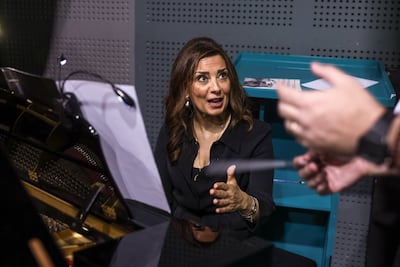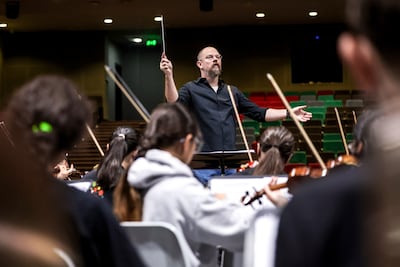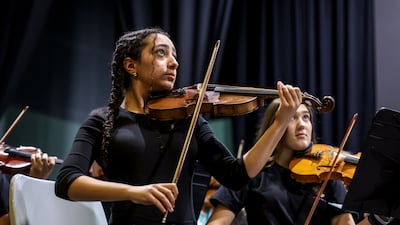In the minutes leading up to the biggest performance of her young life, Renee Youssef, 14, will ensure she and her fellow National Youth Orchestra of Dubai members are in perfect pitch.
More than leading any final tuning adjustments, the Egyptian-Lebanese violinist will project calmness and confidence. She'll strike the kind of posture that rallies the ensemble – that has earned a rare chance to perform at New York City’s famed Carnegie Hall on Friday – with quiet assurance.
“It is an important role and one that I am grateful for and take seriously,” Youssef tells The National. “It is about trying to make sure we are all ready and prepared, so when the show starts and they see the first stroke of my bow, they know we are all in this together.”
The performance, regarded as the first by a UAE orchestra at the historic venue, marks the latest achievement of the NYO. Founded in 2018 with just four students, the ensemble has grown to include five orchestras comprising 200 musicians aged between five and 18.

Entry and seating positions are determined by audition, with members taking part in a rigorous 37-week season punctuated by weekly rehearsals.
“What we all built together is a system,” co-founder Amira Fouad says. “It’s not just an orchestra anymore. It’s a philosophy, a movement, an idea and a mission.
“And that’s why people are saying this isn’t just about playing. It’s not just about going to rehearsal. It’s about learning how to be independent, how to show up, how to take responsibility, how to lead. It started with an instrument, perhaps a cello at an audition, and now we’re here at Carnegie Hall.”
Fouad knows it sounds almost too good to be true. When the official email invitation was sent to her in May, on the back of the company’s annual season closing concert at Dubai Opera, she initially binned it.
“Listen, I deleted it because I was sure it was some sort of scam,” Fouad says. “When you get an email saying: ‘Congratulations, your orchestra has been selected to perform at Carnegie Hall’, you assume it’s not genuine. It wasn’t until they followed up and scheduled a Zoom meeting that I realised this was actually happening.”
The proposal was for the orchestra to take part in the Viennese Masters Invitational, with the NYO joining fellow youth ensembles from the US, including the South Carolina Philharmonic Youth Orchestra and Utah’s Mountain View High School Chamber Orchestra.
The next 10 months saw the NYO undergoing intensive preparation, both on stage and behind the scenes, to bring more than 100 people to New York. Families and staff largely self-funded the journey, with Dubai Culture also providing scholarships for select members.
That financial reality only served to strengthen the resolve of all involved, Fouad notes.

“It felt like one big family project – the parents, the volunteers and our team all doing their part,” she says. “It really brought us together in a different way, because everyone understood this wasn’t just a trip, but a huge commitment. The fact that people still went ahead with it shows how much belief there is in what we’re doing.”
The commitment was evident when The National visited the final rehearsals at Dubai’s Nord Anglia International School at the weekend. Emirati, Egyptian, Lebanese, Indian and Japanese students were fine-tuning works by composers including Beethoven and Mozart in preparation for Carnegie Hall.
That harmony extends beyond the stage, with students exchanging tips and experiences on a regular basis.
“I honestly feel like I’ve grown up here,” says Palestinian Zein Khawaja who, at 17, has already spent seven years with the orchestra. “What I love is that it doesn’t feel like we’re in separate groups. We all talk to each other and learn so much from different people because there are so many nationalities here – and that’s really interesting.”
That sense of collectiveness is by design, Fouad notes, with constant rehearsals fostering a cohesiveness built on discipline and mutual accountability.
“These are life skills, which they’re taught from the moment they join the prep orchestra,” Fouad says.
“They might show up with their cello and a teddy bear, but it starts there – being independent, being responsible. We don’t wait until they’re 17 to deliver that message. It’s embedded in everything we do. You show up. You prepare. You listen. You work with others. That’s what it means to be part of an orchestra – and part of a community.”

US conductor and educator Jonathan Barrett, who joined the NYO in 2022 after teaching in schools across Abu Dhabi and Dubai, is helping shape that mindset.
“The word maestro actually means teacher,” he says. “And the lessons you teach go deeper than music itself. You're trying to instil values – self-control, focus, discipline – so they can overcome challenges.
“The music is hard. Very hard. But if they learn to persist, listen and work together, they'll realise those same qualities apply to everything else in life. So, yes, we're preparing for concerts but, really, we're preparing people.”
Khawaja is looking forward to carrying those life lessons with her as she eventually moves on from the orchestra for university. “For me, music is an escape – something I turn to when I’m stressed,” she says. “I don’t want it to become my whole life, because then I’d lose that feeling. I plan to study architecture, but I’ll definitely keep playing the violin. It’s a part of who I am. Even if it’s just in my room, I know I’ll always come back to it.”
Whether or not each member pursues music in the long term, the NYO’s performance at Carnegie Hall will continue building the ensemble’s legacy – and leave a lasting mark on each performer. The kind that comes from taking on a monumental challenge and, together, seeing it through.




